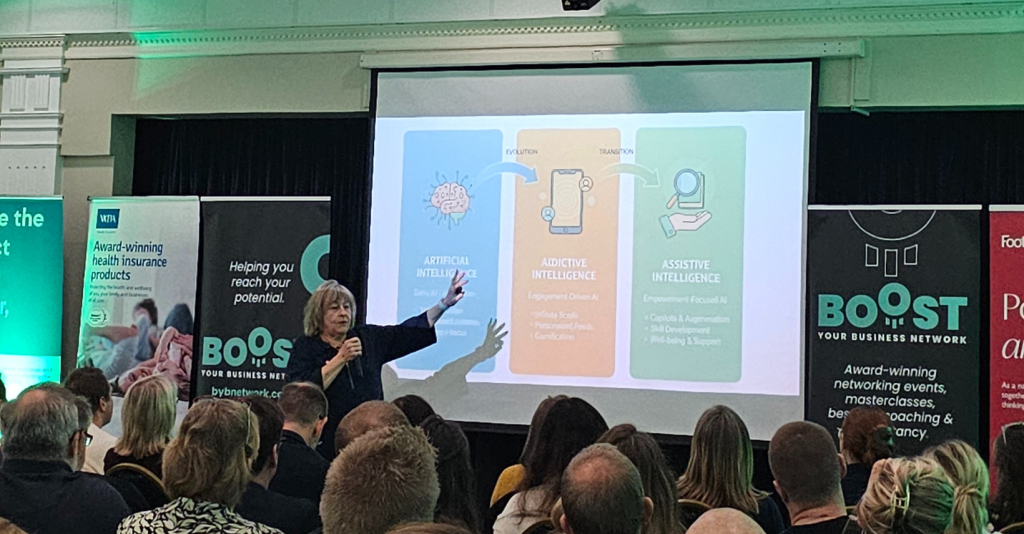By Julie Hawker, CEO of Cosmic
Every day, I see the transformative power of artificial intelligence—not just in my work, but in the lives of those around me. As a leader, I’m often asked: “What does your day look like when AI is evolving so rapidly, and people are turning to you for guidance?” The answer is both inspiring and challenging. It’s a story I believe is especially important for women and young people as we shape the future of work.
The New Reality: AI as a Daily Companion
My mornings no longer begin with a scramble through reports and emails. Instead, AI-powered dashboards deliver real-time insights, helping me focus on what matters most. Before meetings, my AI assistant curates briefings from emails, chats, and documents, keeping me prepared and focused on people, strategy, and planning. Throughout the day, AI tools monitor communications, highlight key themes, and suggest ways to improve engagement. Learning is no longer squeezed into the margins; AI surfaces relevant updates and resources tailored to my interests and development needs. By afternoon, I’m using AI to review insights for strategic decisions, drawing on data from a wide range of sources. At the end of the day, my AI assistant helps me reflect, plan, and prioritise for tomorrow. It’s not about replacing human judgement, it’s about freeing up time and mental space for what only humans can do: lead, make wise decisions, and drive innovation.
The Human Side: Ethics, Inclusion, Sustainability and Responsibility
With all this promise comes responsibility. AI is not a moral compass, it’s a tool. As leaders, we must set the tone for ethical and responsible use. That means asking tough questions:
- Who is accountable when AI gets it wrong?
- How do we ensure transparency, fairness, and trust?
- What is the real carbon impact of AI?
- And crucially, how do we make sure everyone benefits, not just a privileged few?
This is where the conversation about women, young people and AI becomes urgent. Research shows women are underrepresented in AI development and leadership. AI systems can perpetuate existing biases if we’re not vigilant. Jobs held by women are three times more likely to be displaced by AI in the coming years. If we want AI to serve everyone, we need diverse voices shaping its future.
Upskilling: Our Best Defence and Greatest Opportunity
The pace of change can feel overwhelming, and it’s natural for staff to worry about job displacement. But here’s what I’ve learned: upskilling is our best defence—and our greatest opportunity. By investing in AI literacy, critical thinking, and digital skills, we empower ourselves and our teams to adapt, thrive, and shape the future. These are the four essential AI skills every staff member should develop as per a newly published report from FutureDotNow – Embedding AI into the Essential Digital Skills Framework – FutureDotNow
For women, upskilling is especially powerful. It breaks barriers, challenges stereotypes, and secures a place in the digital workplace. At Cosmic, our programmes are making a real difference—helping people gain the confidence and skills to lead in a digital world.
We currently offer two 60-hour SFIA Level 3 Skills Bootcamps:
- AI for Workplace Productivity
- Power Platform and Process Automation
These programmes help organisations unlock efficiency, spark innovation, and support career progression. They’re heavily subsidised by the Department for Education with 90% funded for SMEs and 70% funded for organisations with more than 250 staff. This makes now the perfect time to invest in your team’s future. Cosmic Skills Bootcamps | Cosmic
Leading by Example
Leaders must engage directly with these technologies. Don’t outsource your learning, embrace it. Be open about the risks and pace of change, but also about the opportunities. Set clear objectives for how AI can serve your business and your people. Establish policies and guardrails to protect your data. Support your teams as they adapt, and champion a culture of continuous learning.
Looking Ahead
The future of work won’t just happen to us, it’s something we can shape. By prioritising upskilling and leading with ethics and empathy, we can ensure AI becomes a force for good. Let’s make sure everyone has the tools and opportunities to thrive in this new era.


